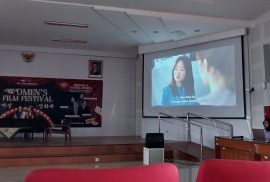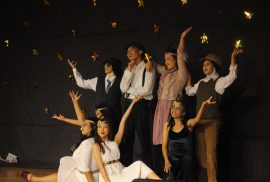Yogyakarta, Thursday, October 31st 2024. Directorate of Partnership and Global Relations (DKRG) UGM through UGM Buddy Club Community under the UGM Office of International Affairs, organized Malam Kliwon – The Indonesian Halloween Experience. This activity is to introduce and preserve Indonesian local culture that is rich in spiritual values and local beliefs to international students. Held at Kolektif Collaboration Space, students consisting of international exchange students from various study programs and INCULS participated in this activity from 18:00 WIB to 22:30 WIB.
Night Kliwon activities began with an open gate at 18:00 WIB until 19:00 WIB, international students and local Buddy students from the UGM Buddy Club Community took attendance first outside the room where the activity was held. Next, the students had a sharing session about mystical or horror stories from their respective countries. After that, a movie watching session titled, “Pengabdi Setan 2” as the work of director Joko Anwar, was shown as an introduction to the intricacies of horror films with an Indonesian atmosphere. Not to forget, after the joint viewing session ended, the international students and local students along with the representative guests present shared their impressions from watching the movie.
On this occasion, Takeru Homma, an exchange student from Japan to the Tourism Study Program, Faculty of Cultural Sciences UGM, shared his impressions. “The event was really fun, I enjoyed eating with my friends, chatting, watching the movie, and showing each other our costumes. Although with the movie viewing session, everyone was just glued to watching, so there wasn’t much chance to interact. I think it would be better if there were programs that allowed more interaction among international students.”.
From the implementation of this activity, Malam Kliwon – The Indonesian Halloween Experience is expected to be a forum for introducing Indonesian culture between local students and international students. Building a memorable experience and a means of learning about Indonesia’s unique culture.






